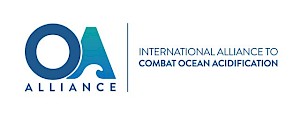OSPAR has become an Affiliate Member of the International Alliance to Combat Ocean Acidification
The OSPAR Commission has become an Affiliate Member of the International Alliance to Combat Ocean Acidification (OA Alliance), an initiative launched in 2016 to increase ambition for climate action and ensure resilience of marine ecosystems and coastal communities.
What is the OA Alliance?
 The OA Alliance brings together governments and organisations from across the globe dedicated to taking urgent action to protect coastal communities and livelihoods from the threat of ocean acidification and other climate-ocean impacts. It aims to elevate the urgency and ambition for climate action, integrate ocean actions across climate commitments and frameworks, and translate knowledge into policy actions and investments. To date, the OA Alliance includes over 130 members across 22 countries representing a diversity of national, state, municipal, and sovereign tribal, indigenous, and First Nation governments along with many dedicated affiliate partners like NGOs, seafood industry leaders, and local academia.
The OA Alliance brings together governments and organisations from across the globe dedicated to taking urgent action to protect coastal communities and livelihoods from the threat of ocean acidification and other climate-ocean impacts. It aims to elevate the urgency and ambition for climate action, integrate ocean actions across climate commitments and frameworks, and translate knowledge into policy actions and investments. To date, the OA Alliance includes over 130 members across 22 countries representing a diversity of national, state, municipal, and sovereign tribal, indigenous, and First Nation governments along with many dedicated affiliate partners like NGOs, seafood industry leaders, and local academia.
OSPAR’s Work on Ocean Acidification
Ocean and climate are intrinsically linked. The ocean is a major driver and amplifier to our
climate system and, at the same time, the ocean is impacted by changes to our climate. Global problems like ocean acidification – which is a major threat to marine species and has direct consequences to ecosystem services – have local impacts that require unique actions.
OSPAR’s Intersessional Correspondence Group on Ocean Acidification (ICG-OA) is leading OSPAR’s work on the monitoring and assessment of ocean acidification in the North-East Atlantic and provides the scientific knowledge that contributes towards achieving OSPAR’s vision of “a clean, healthy and biologically diverse North-East Atlantic Ocean, which is productive, used sustainably and resilient to climate change and ocean acidification”.
ICG-OA has prepared a soon-to-be-published report on ocean acidification as part of OSPAR’s next holistic assessment of the state of the North-East Atlantic, the Quality Status Report (QSR) 2023. As part of this assessment, OSPAR experts found that ocean acidification is observed in all OSPAR Regions, and projections show that it will keep occurring and even accelerate under the higher CO2 emission scenarios.
Mutual benefits for OSPAR and the OA Alliance
International and multi-government commitments to addressing climate change and sustainable development play an important role in stimulating collective action. The OA Alliance is providing a global context for local actions that help governments and communities understand and respond to climate-ocean change, including through the organisation of events and workshops. Facilitated through the OA Alliance, national, subnational, regional, and tribal governments are proactively responding to the impacts of ocean acidification as they create OA Action Plans to effectively promote solutions and advancing knowledge into action.
Upon joining the OA Alliance, OSPAR endorsed the OA Alliance’s Global Call to Action and committed to actions that:
- advance scientific understanding of ocean acidification;
- reduce the causes of acidification;
- protect the environment and coastal communities from the impacts of a changing ocean;
- expand public awareness and understanding of acidification; and
- build sustained support for tackling this global problem.
This partnership will contribute to supporting the delivery of the OSPAR North-East Atlantic Environment Strategy (NEAES) 2030 that was adopted on 1 October 2021 at OSPAR’s Ministerial meeting held in Cascais, Portugal.
For more information:
OA Alliance: https://www.oaalliance.org/
OSPAR Commission: https://www.ospar.org/
